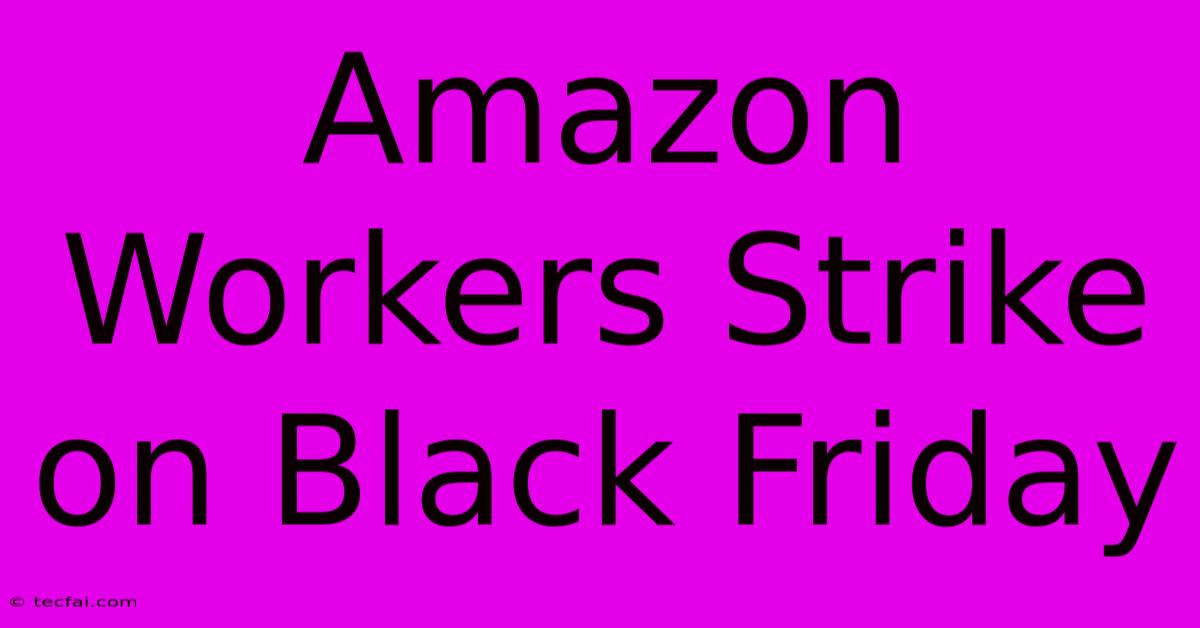Amazon Workers Strike On Black Friday

Discover more detailed and exciting information on our website. Click the link below to start your adventure: Visit Best Website tecfai.com. Don't miss out!
Table of Contents
Amazon Workers Strike on Black Friday: A Growing Movement?
Black Friday, traditionally a day of massive consumer spending and frenzied shopping, took on a different dimension in recent years with the increasing visibility of Amazon worker strikes. While not always occurring on Black Friday itself, the timing around this peak shopping period highlights crucial labor issues within the e-commerce giant. This article delves into the reasons behind these strikes, their impact, and the potential for future action.
Why are Amazon Workers Striking?
The reasons behind Amazon worker strikes are multifaceted and deeply rooted in concerns about working conditions, pay, and employee treatment. Key issues consistently raised include:
Inadequate Wages and Benefits:
Many Amazon workers argue that their wages are insufficient to meet the cost of living, especially considering the demanding nature of their jobs. This is often coupled with complaints about limited or inadequate health benefits, impacting their overall well-being and financial stability. The narrative often highlights the contrast between Amazon's immense profits and the relatively modest compensation offered to its frontline employees.
Grueling Work Conditions:
Stories of intense pressure, demanding quotas, and insufficient break times are frequently cited as contributing factors to worker discontent. The fast-paced, physically demanding nature of many roles, coupled with the constant surveillance inherent in Amazon's logistics operations, creates a stressful and often unsustainable work environment. This contributes significantly to employee burnout and dissatisfaction.
Safety Concerns:
Reports of workplace injuries and inadequate safety measures further fuel the calls for change. Workers often highlight a lack of sufficient safety training and equipment, leading to a higher risk of accidents and injuries. The pressure to maintain productivity often overshadows safety concerns, creating a potentially dangerous working environment.
Lack of Union Representation:
The absence of strong union representation in many Amazon facilities is another significant factor. Workers often feel powerless to negotiate better conditions or address grievances effectively without collective bargaining power. The strikes often serve as a powerful way to voice their concerns and demand better treatment.
The Impact of Amazon Worker Strikes
Amazon worker strikes, even if localized, can have a significant impact:
- Disruption to Operations: Strikes can disrupt the smooth functioning of Amazon's logistics network, potentially delaying deliveries and impacting the company's ability to meet its peak demand during Black Friday and the holiday season.
- Public Awareness: These actions draw public attention to the working conditions within Amazon and the broader gig economy, raising awareness about labor issues and potentially influencing public opinion.
- Pressure on Amazon: The strikes put pressure on Amazon to address the underlying issues, potentially leading to improvements in wages, benefits, and working conditions. This pressure comes from both workers and consumers increasingly concerned about ethical sourcing and fair labor practices.
- Inspiration for Other Workers: Successful strikes can inspire similar action at other Amazon facilities and within other companies facing similar labor issues. This creates a ripple effect, encouraging workers to organize and demand better treatment.
The Future of Amazon Worker Strikes
The frequency and scale of Amazon worker strikes suggest a growing movement. As awareness of labor issues within the company increases, and as workers become increasingly organized, we can expect to see further actions in the future. The outcome of these strikes will significantly influence not only Amazon's internal policies but also the broader landscape of labor relations within the e-commerce industry and beyond. The future will likely see a continued debate around fair labor practices, worker rights, and the ethical considerations of a globalized economy dominated by powerful tech companies. The Black Friday period, with its immense consumer demand and high pressure on warehouse workers, remains a focal point for this ongoing struggle.

Thank you for visiting our website wich cover about Amazon Workers Strike On Black Friday. We hope the information provided has been useful to you. Feel free to contact us if you have any questions or need further assistance. See you next time and dont miss to bookmark.
Featured Posts
-
Early Vote Favors Gerry Hutch
Nov 30, 2024
-
Apples Black Friday I Phone 15 Sale
Nov 30, 2024
-
Ai Healthcare Data Annotations Impact
Nov 30, 2024
-
Black Friday 40 Off Lego Star Wars
Nov 30, 2024
-
Plumtree Se 8 Bulle Teen Stormers
Nov 30, 2024
